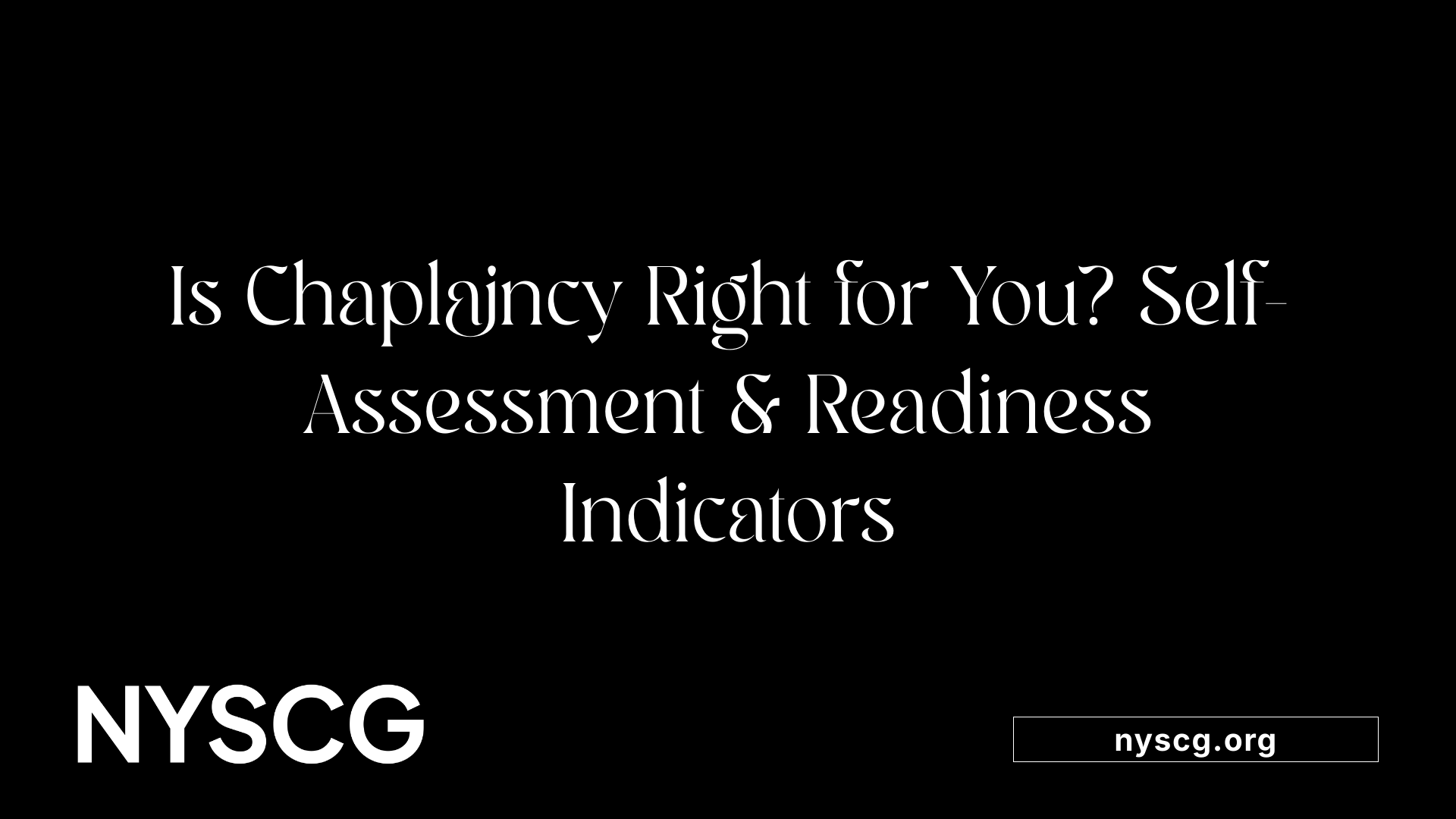Transitioning from Ministry to Chaplaincy: A Career Pivot Guide


Transitioning from a traditional ministry role to a career in chaplaincy is a meaningful change that allows faith-based professionals to serve in diverse secular settings, providing spiritual support, emotional care, and crisis intervention. This guide explores the essential steps, educational pathways, skills, and opportunities to help you pivot successfully into this impactful vocation.

Transitioning from a pastoral or ministry role into chaplaincy involves a blend of education, practical experience, and strategic relationship-building. Begin by seeking guidance from trusted spiritual advisors such as pastors, seminary faculty, or experienced chaplains who can provide insight into the profession. Pursuing relevant educational credentials is essential; this typically includes earning a bachelor’s degree in religious studies or an affiliated field, followed by a master’s degree like a Master of Divinity (MDiv) or similar advanced studies.
Additional specialized training, notably Clinical Pastoral Education (CPE), is highly recommended, especially for those aiming to serve in healthcare or hospital settings. Gaining hands-on experience through volunteering or internships provides valuable practical skills and clarifies personal readiness. Engaging in chaplaincy training programs or shadowing experienced chaplains can deepen understanding of daily responsibilities.
Professional certification from organizations such as the Association of Professional Chaplains (APC) helps meet employment standards and enhances credibility. Building relationships within faith communities, healthcare organizations, or military chaplain corps is key, as endorsement from a recognized religious organization is often required for certain settings. Networking with chaplaincy groups and church leaders can also open doors and provide ongoing support for career development.
Overall, the transition is a process of aligning spiritual calling with tangible qualifications and experience, ensuring preparedness to serve diverse populations.
Planning a successful transition into chaplaincy begins with honest self-assessment. Evaluate your interpersonal skills, emotional resilience, and spiritual maturity. Consider whether you possess qualities such as active listening, empathy, crisis intervention, and cultural sensitivity, which are vital for effective spiritual care.
Gaining relevant education is foundational. This includes pursuing a graduate theological degree—commonly an MDiv or similar—and obtaining certification from a recognized body like the APC. Practical experience adds depth; volunteering in hospitals, hospices, military settings, or community organizations allows you to develop necessary hands-on skills.
Understanding the operational aspects of chaplaincy—such as documentation methods like the DAROP (Describe, Assess, Respond, Option, Plan) format—is crucial. Ensuring the ability to complete timely and appropriate assessments, like performing initial visits within five days of patient admission, demonstrates preparedness.
Assess your capacity to adapt your spiritual support to various scenarios, including different diagnoses such as Alzheimer’s, COPD, or malnutrition. Practice programming visits tailored to individual needs and participate in multi-faith or intercultural training.
Reflect continually on these experiences to determine your strengths and areas for growth. This ongoing reflection ensures that your skills remain aligned with the high standards required in chaplaincy, and it helps identify readiness for the next steps in your career journey.
Both pathways—educational achievement and experiential learning—are essential components of a strategic plan that prepares you to serve effectively as a chaplain, fully embracing your spiritual vocation while addressing the practical demands of the role.

Becoming a chaplain typically begins with obtaining a bachelor's degree from an accredited college or university. This foundational education provides essential knowledge and skills, often in fields like theology, psychology, or philosophy.
For most chaplaincy roles, especially in healthcare, military, or specialized settings, candidates are encouraged or required to pursue a master’s degree such as a Master of Divinity (M.Div) or an equivalent graduate theological degree. These advanced degrees deepen theological understanding, pastoral skills, and intercultural competence, preparing individuals for the diverse needs of their future roles.
In addition to academic credentials, clinical pastoral education (CPE) is a crucial component of training. CPE involves hands-on experiential learning, usually through supervised units—commonly four—to develop caregiving skills, self-awareness, and effective communication. Accredited by bodies like the Association for Clinical Pastoral Education (ACPE), CPE enhances practical skills and prepares candidates for real-world chaplaincy work.
Certification from reputable organizations signifies a standard of professional competence. Recognized certifying bodies include the Association of Professional Chaplains (APC), the National Association of Catholic Chaplains (NACC), and the Spiritual Care Association. To obtain certification, applicants generally must demonstrate the following:
These certifications often include specialized pathways tailored to different environments such as hospitals, military, or community settings. Maintaining certification requires ongoing professional development, continuing education, and instance of reflective practice.
Overall, the pathway combines academic preparation, practical clinical training, endorsement, and proven competency, ensuring that chaplains are equipped to provide compassionate spiritual and emotional care across various sectors.
| Education Level | Typical Duration | Purpose | Additional Requirements |
|---|---|---|---|
| Bachelor's Degree | 3-4 years | Foundational knowledge | Generally required for entry-level roles |
| Master's Degree (e.g., M.Div) | 2-3 years | Advanced theological and pastoral training | Preferred or required for many positions |
| Clinical Pastoral Education (CPE) | 1-2 years | Hands-on pastoral care training | 4 units commonly needed for certification |
| Certification Body | Main Focus | Certification Requirements | Ongoing Commitments |
|---|---|---|---|
| Association of Professional Chaplains (APC) | Healthcare and multisector | Degree, CPE, endorsement, hours, exams | Continuing education, annual renewal |
| National Association of Catholic Chaplains (NACC) | Catholic-specific | Similar to APC, with religious endorsement | Recertification every 5 years |
| Spiritual Care Association | Broad-based spiritual care | Education, clinical hours, peer reviews | Regular professional development |
This structured combination of education, supervised clinical training, endorsement, and certification ensures that chaplains are well-prepared to meet the complex spiritual and emotional needs of those they serve.
A career in chaplaincy combines educational background, practical training, and personal traits essential for effective spiritual care. Most aspiring chaplains begin with foundational academic qualifications, typically holding a bachelor’s degree in religious studies, theology, or a comparable field. To advance into specialized settings like hospitals or military environments, a master’s degree such as a Master of Divinity (MDiv) or Master of Theological Studies (MTS) is highly recommended.
In addition to academic credentials, clinical pastoral education (CPE) plays a crucial role, particularly in healthcare and hospital settings. CPE involves supervised, experiential training where candidates interact with patients, families, and staff, developing caregiving skills, emotional resilience, and an understanding of diverse needs. Many organizations and institutions require candidates to complete multiple units of CPE before qualifying for certification or employment.
Certification from recognized professional bodies, such as the Association of Professional Chaplains (APC) or the National Association of Catholic Chaplains (NACC), further supports career development by validating competence and professionalism. These certifications often require completion of specific educational and clinical training components and demonstrate a commitment to high standards in spiritual caregiving.
Beyond formal education and certifications, personal qualities are vital for success in chaplaincy. Empathy stands at the forefront, enabling chaplains to genuinely connect with individuals in distress. Active listening and effective communication skills are necessary for understanding needs, providing comfort, and facilitating conversations around sensitive topics like death, grief, or existential questions.
Boundary setting and emotional resilience are equally important, as chaplains regularly encounter emotionally charged situations. The ability to maintain professional boundaries while offering compassionate support ensures sustainable practice.
Depending on the employment setting, ordination might be a requirement, especially for performing religious sacraments such as baptisms or Eucharist in Christian contexts. However, many chaplains serve effectively as laypersons, provided they possess appropriate training, credentials, and endorsement from their faith group.
Overall, a combination of rigorous education, practical clinical experience, and personal virtues prepares individuals for the multifaceted role of a chaplain, ready to meet diverse spiritual and emotional needs across various environments.

Chaplaincy offers a wide range of career pathways across various sectors. Many chaplains find employment in hospitals, where they provide spiritual support to patients, families, and healthcare staff. Military chaplains serve service members and their families in the armed forces, often deployed overseas or stationed in bases abroad. Hospice chaplains work with terminally ill patients, offering comfort and spiritual care during end-of-life transitions.
Prisons and correctional facilities are another prominent setting, where chaplains support inmates' spiritual needs and assist with rehabilitation efforts. Educational institutions, including high schools, colleges, and universities, also employ chaplains to provide pastoral care, counseling, and religious services to students and staff.
Beyond traditional roles, chaplains can pursue specialization in areas like mental health institutions, law enforcement agencies, or senior living communities. Advancement opportunities include leadership positions such as chaplain coordinator, program director, or chief chaplain.
To enter these pathways, applicants typically need a bachelor’s degree followed by a master’s degree in divinity, theology, or related fields. Completing clinical pastoral education (CPE) is essential, especially for healthcare and hospice settings. Certification from reputable organizations like the Association of Professional Chaplains (APC) or National Association of Catholic Chaplains (NACC) further enhances employment prospects.
Many chaplains also undertake additional training for secular or non-denominational contexts, expanding their career options into community services, corporate settings, or mental health programs.
Overall, the field encourages continuous learning and adaptation, enabling chaplains to serve in meaningful ways across diverse institutions.
| Setting | Typical Roles | Opportunities for Growth | Required Qualifications |
|---|---|---|---|
| Hospitals | Patient support, pastoral care, leading religious rituals | Leadership roles like senior or head chaplain | Master's degree, CPE, certification, endorsement |
| Military | Spiritual support for service members, deployments | Senior chaplain, deployment specialist | Endorsement by religious organization, specialized training |
| Hospice | End-of-life care, grief counseling | Program supervisor, hospice director | Master’s in theology, CPE, certification |
| Prisons | Inmate counseling, spiritual programming | Prison chaplain supervisor | Degree in theology or related, endorsement, CPE |
| Education | Campus ministry, pastoral counseling | Program coordinator, department head | Bachelor's and master's degrees, specific training |
This diverse landscape not only offers multiple avenues for personal vocation but also provides opportunities for leadership, specialization, and expanding the reach of spiritual care.
Determining personal suitability and readiness for chaplaincy involves a combination of spiritual discernment, practical experience, and self-awareness. It begins with ongoing reflection on one's calling, spiritual health, and motivation to serve others in various settings.
A useful analogy is the example set by Jesus, who sensed divine timing and responded compassionately. Similarly, prospective chaplains are encouraged to develop spiritual awareness by slowing down, observing the emotional and spiritual atmosphere around them, and listening attentively to the Holy Spirit during real-time situations. This awareness helps in offering authentic empathy and effective leadership.
Practical preparation plays a vital role. Completing clinical pastoral education (CPE) units allows individuals to gain hands-on experience in emotional and spiritual support, deepen their understanding of diverse needs, and clarify their calling. CPE also helps develop skills in crisis intervention, active listening, and interfaith care.
The sense of being called often develops gradually through personal prayer, study, mentorship, and real-world ministry encounters. Building relationships with experienced chaplains or spiritual mentors provides valuable insights and guidance.
Ultimately, readiness encompasses emotional resilience, cultural sensitivity, spiritual discernment, and formal training. It requires a willingness to serve in often challenging environments, embody Christ’s presence, and meet people where they are—spiritually, emotionally, and physically.
Integrating these elements ensures that one is not only prepared but also confident to undertake the diverse responsibilities of chaplaincy, from leading interfaith services to providing grief support. It is a journey of continuous growth, guided by a deepening personal faith and a commitment to compassionate service.
Aspiring chaplains have access to a wide array of training programs and resources designed to equip them with the necessary skills and knowledge for effective ministry. These resources include accredited educational programs, online courses, workshops, seminars, and mentorship opportunities provided by reputable chaplaincy associations and educational institutions.
One notable training program is the I.F.O.C. Chaplaincy Training Course, a comprehensive 40-hour accredited program that covers crucial topics such as trauma, grief, and spiritual care. This program is recognized by universities like Manna University and Heidelberg University, ensuring that participants gain recognized credentials and foundational competencies.
There are multiple pathways to training, accommodating diverse learning preferences and career focuses. Some programs offer in-person training sessions, while others are fully online, making it easier for students to learn from anywhere. Specialized certifications are also available for specific fields within chaplaincy, such as first responders, disaster response, or community outreach.
Ongoing professional development is vital in this evolving field. Chaplains can participate in conferences, webinars, and distance learning modules to stay current with best practices. Reflective practice sessions and case study reviews further deepen a chaplain’s competencies. Many organizations also provide access to resources like textbooks, fact sheets, and digital journals that support continuous learning.
Leading organizations such as the Spiritual Care Association and NHS Education for Scotland maintain online learning centers and certification prep programs. These platforms offer Continuing Professional Development (CPD) opportunities, enabling chaplains to renew certifications and expand their specialized skills.
In summary, educational and professional development resources for chaplains are diverse and accessible, supporting their growth from foundational training to advanced specialization. Aspiring chaplains are encouraged to explore various accredited programs and utilize online learning tools to build a robust skill set that meets the demands of today's spiritual care landscape.
Deciding whether you are prepared to become a chaplain involves a combination of spiritual insight, emotional maturity, and practical experience. It begins with ongoing discernment—deep, reflective prayer and self-assessment—to understand your motivations, spiritual calling, and emotional resilience.
Spiritual discernment is essential. Like Jesus’ example of sensing divine timing, aspiring chaplains need to develop an acute awareness of the Holy Spirit’s guidance. This involves slowing down, observing the emotional and spiritual atmosphere around you, and listening attentively to divine prompts. Cultivating this sensitivity helps in responding with genuine compassion and leadership in diverse situations.
Equally important is practical preparation. Engaging in clinical pastoral education (CPE) provides hands-on experience that clarifies personal calling while strengthening caregiving skills. Through CPE, aspiring chaplains learn to manage complex emotional and spiritual needs, gaining confidence in serving others. This real-world experience is often pivotal in confirming whether one's gifts and passions align with chaplaincy.
A true calling develops gradually. It is rooted in a personal relationship with God—marked by prayer, scripture study, and spiritual accountability—and a desire to serve in times of crisis, suffering, or transition. Many find that their sense of vocation grows stronger as they witness the impact of compassionate spiritual care.
Readiness is also demonstrated by emotional resilience and cultural sensitivity. Chaplains often face difficult conversations, grief, and uncertainty. Developing the capacity to remain grounded and empathetic under pressure is crucial.
Combining emotional resilience, spiritual discernment, cultural awareness, and formal training creates a well-rounded foundation for effective chaplaincy. This blend allows chaplains to embody Christ’s presence, providing comfort and hope in both challenging and everyday moments.
In sum, assessing one's suitability for chaplaincy involves deep reflection, spiritual sensitivity, practical training, and emotional strength. Together, these elements prepare individuals to serve with compassion and authority in a variety of settings, from hospitals to military units, ensuring they can meet individuals’ needs holistically.
Aspiring chaplains have access to a broad range of educational and training opportunities that prepare them for service in diverse settings. Formal theological education typically begins with earning a bachelor's degree, followed by advanced degrees such as a Master of Divinity (MDiv) or equivalent. These academic programs lay the foundation with courses in theology, ethics, pastoral care, and intercultural communication.
Beyond academic degrees, Clinical Pastoral Education (CPE) is a cornerstone of practical training. CPE involves supervised, hands-on experience working directly with patients, families, and staff in settings like hospitals, hospices, or military facilities. These units foster essential skills such as spiritual assessments, crisis intervention, and interfaith dialogue.
Mentorship plays a vital role in professional growth. Many professional organizations, such as the Association of Professional Chaplains (APC) and the National Association of Catholic Chaplains (NACC), facilitate mentorship programs that connect novice chaplains with experienced colleagues. These relationships offer guidance, support, and opportunities for reflection.
Numerous resources are available through accredited programs and organizations. For example, the I.F.O.C. Chaplaincy Training Course offers a 40-hour curriculum that addresses trauma, grief, spiritual resilience, and more. Recognized by institutions like Manna University and Heidelberg University, this course provides foundational knowledge crucial for specialized chaplaincy fields.
Additional professional development occurs through workshops, seminars, and conferences. Topics often include emerging issues like trauma-informed care, cultural competency, digital ministry, and crisis response.
Online learning platforms have expanded access to quality training. Organizations such as the Spiritual Care Association and NHS Education for Scotland provide online certification programs, continuing education units (CEUs), and resource libraries. Webinars, virtual symposia, and e-learning modules support ongoing skill enhancement.
Textbooks, case studies, and digital journals also complement formal training. These materials keep chaplains updated on best practices, new research, and evolving societal needs.
In summary, aspiring chaplains can leverage a variety of educational pathways—academic degrees, certification courses, CPE, mentorship programs, and professional development resources—to build a solid foundation for effective ministry. Continuous education ensures they are equipped to meet the spiritual and emotional needs of diverse populations in complex environments.
Transitioning from ministry to a career in chaplaincy is a profoundly rewarding journey that combines one’s spiritual calling, educational preparation, practical training, and personal discernment. This career pivot enables faith leaders to extend their ministry into secular environments, meeting individuals at their most vulnerable with compassion, spiritual insight, and emotional support. By understanding the educational and certification pathways, honing essential skills, and continually developing through training and mentorship, aspiring chaplains can navigate this transition confidently. The opportunities for service are vast—from hospitals and military settings to hospice and corporate chaplaincy—each offering unique ways to serve with integrity and love. Embracing this sacred vocation not only broadens your ministry but also enriches your spiritual life as you bring hope and healing to those in need.
All you need is the will to make the world a better place.
New York State chaplain group inc. is a tax deductible organization with a federal tax Id number 92-383-4921